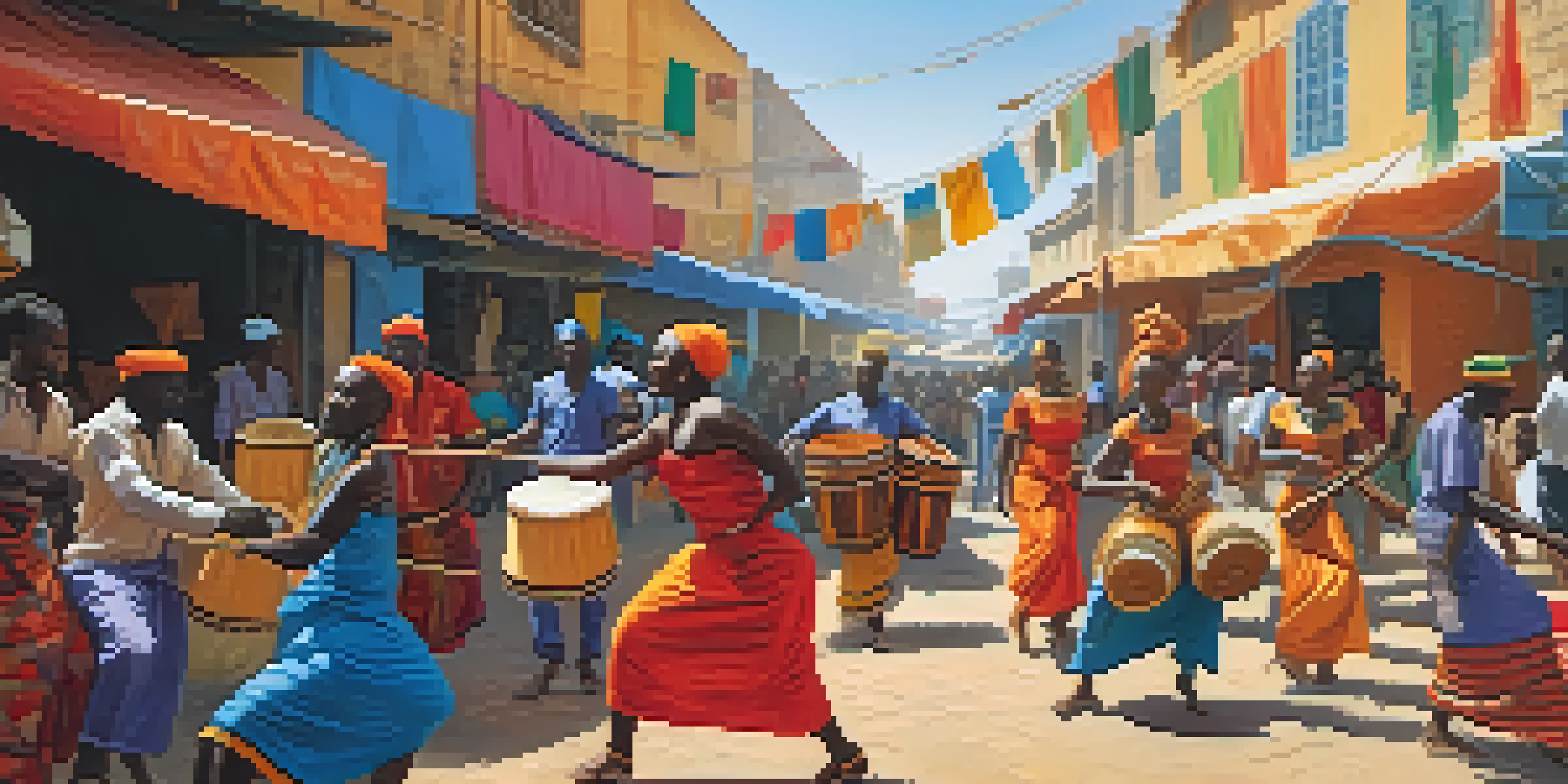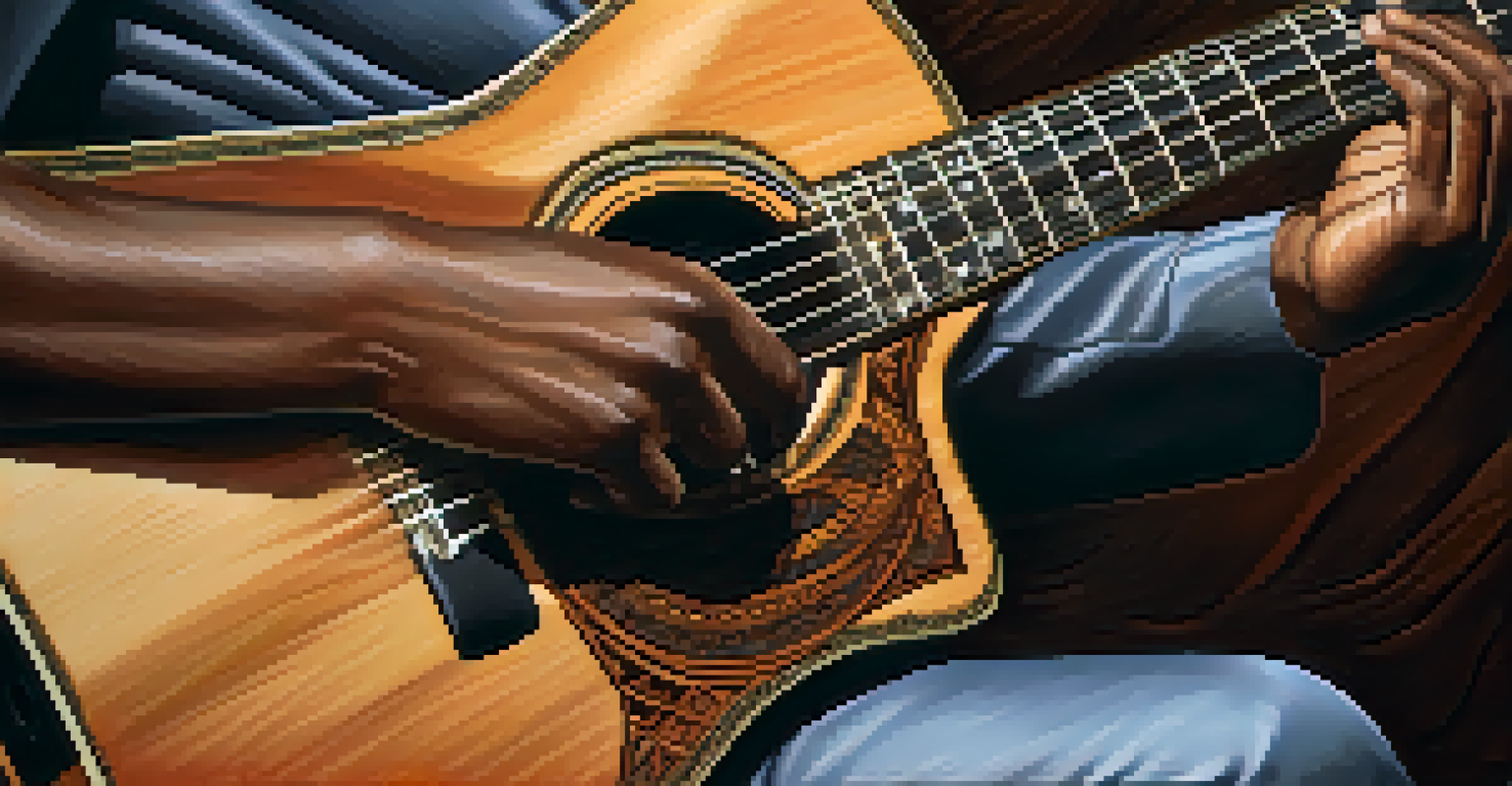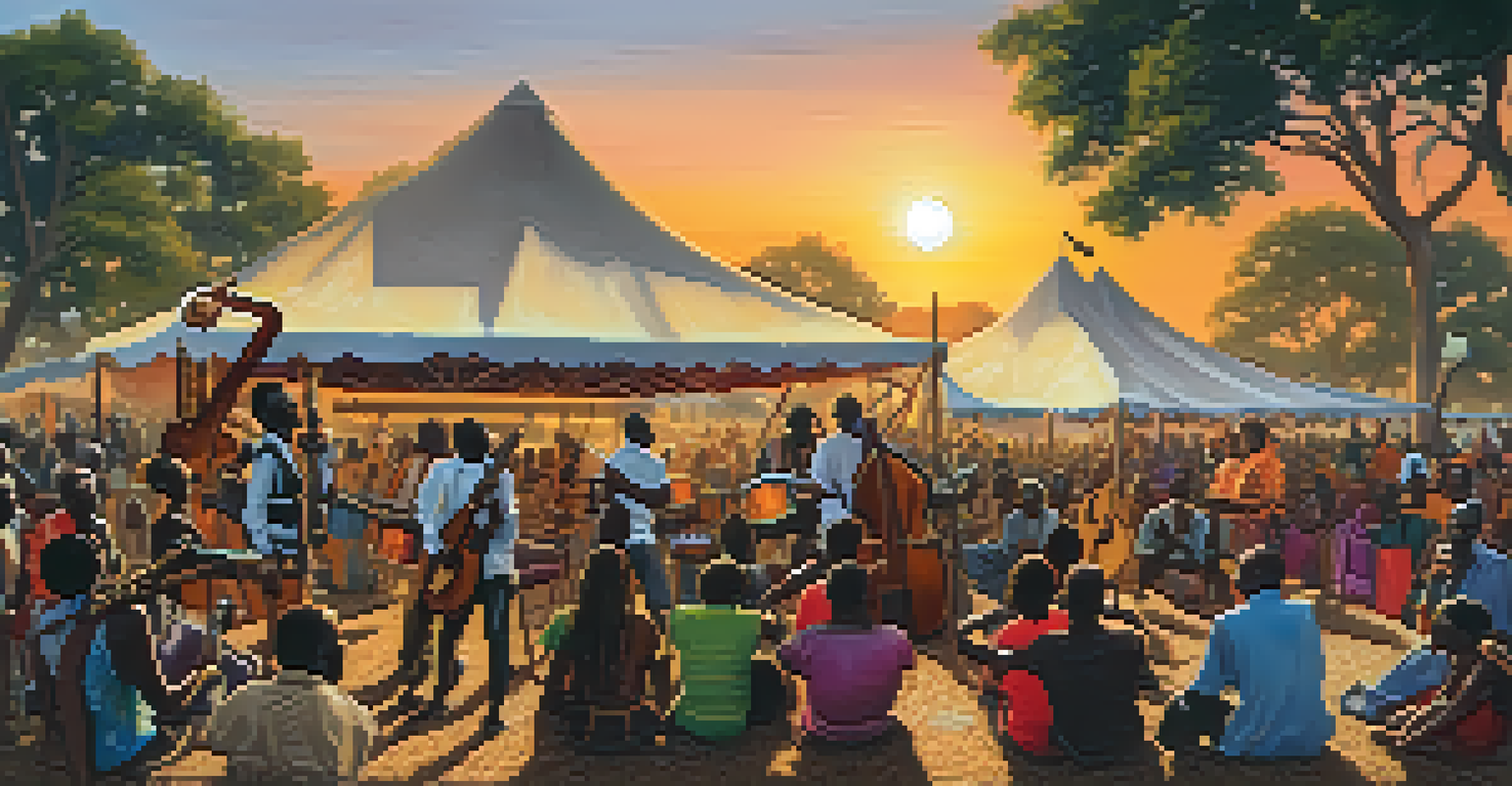Exploring African Rhythms in Modern Guitar Playing Styles

The Rich Tapestry of African Rhythms
African rhythms are deeply rooted in the continent's diverse cultures, creating a vibrant musical landscape. From the polyrhythmic beats of West Africa to the syncopated grooves of Southern Africa, these rhythms tell stories and evoke emotions. This rhythmic foundation has not only influenced traditional music but has also seeped into modern genres, including jazz, rock, and pop.
Music is the shorthand of emotion.
When you listen closely, you can hear how African rhythms add depth and texture to guitar playing. For instance, the use of off-beat strumming patterns and complex time signatures can transform a simple melody into something captivating and dynamic. This blend of traditional rhythm with contemporary techniques has given rise to unique guitar styles that resonate across the globe.
In essence, these rhythms are a bridge between the past and the present, enriching modern guitar music with a sense of history and cultural significance. As musicians continue to explore and incorporate these elements, the possibilities for innovation in guitar playing become endless.
The Influence of Afrobeat on Guitar Styles
Afrobeat, a genre pioneered by Nigerian musician Fela Kuti, is a prime example of how African rhythms have shaped modern guitar playing. Characterized by its intricate guitar riffs and layered percussion, Afrobeat invites guitarists to experiment with syncopation and groove. This genre not only celebrates African musical traditions but also integrates elements of funk, jazz, and highlife.

Guitarists in the Afrobeat style often use techniques like palm muting and rhythmic strumming to create a percussive sound. These methods emphasize the groove, compelling listeners to move and dance. By incorporating African rhythms into their playing, guitarists bring a fresh perspective that highlights the interconnectedness of various musical traditions.
African Rhythms Shape Guitar Sound
The rich rhythms of Africa have significantly influenced modern guitar styles, enhancing their depth and cultural significance.
As musicians delve into Afrobeat, they discover the richness of improvisation, inviting creativity and spontaneity. This freedom allows artists to express themselves authentically while paying homage to their roots, creating a unique sound that resonates with audiences worldwide.
Exploring the Role of Rhythm in African Guitar Music
Rhythm is the heartbeat of African music, and this is especially true in guitar playing. Traditional African guitar styles often employ repetitive patterns that build a hypnotic effect, drawing listeners into a trance-like state. This emphasis on rhythm not only enhances the musical experience but also serves as a powerful storytelling tool.
The beauty of music is that it connects people. It brings us together, no matter our differences.
For example, the use of fingerpicking in styles like Malian music showcases intricate rhythmic patterns that can convey deep emotions. Guitarists often layer these patterns to create a rich tapestry of sound, where each note contributes to an overarching narrative. This approach encourages listeners to engage with the music on a deeper level.
By understanding and embracing these rhythmic principles, modern guitarists can elevate their playing and connect with audiences in new ways. The rhythmic foundation laid by African traditions can inspire musicians to explore their creativity and develop their unique voice within the guitar community.
The Fusion of African and Western Guitar Techniques
In today's music scene, the fusion of African and Western guitar techniques is creating exciting new sounds. Many contemporary guitarists draw inspiration from African rhythms while incorporating Western styles like blues and rock. This blend not only broadens their musical palette but also fosters cross-cultural collaboration.
For instance, artists like Ben Harper and Ali Farka Touré have successfully merged African guitar styles with Western genres, creating a sound that resonates with diverse audiences. Their music demonstrates how integrating different techniques and rhythms can lead to innovative compositions that honor both traditions. This cross-pollination enriches the music landscape, offering fresh perspectives for listeners.
Fusion of Cultures in Music
The blending of African and Western guitar techniques creates innovative sounds and fosters cross-cultural collaboration among musicians.
As this fusion continues to evolve, more musicians are encouraged to explore the intersections of African and Western guitar playing. This creative exploration paves the way for new genres and styles, celebrating the beauty of collaboration and cultural exchange.
Notable Guitarists Influenced by African Rhythms
Several renowned guitarists have drawn from African rhythms, allowing their music to flourish with rich textures and vibrant grooves. Artists like Derek Trucks and Kaki King have incorporated African-inspired techniques into their playing, showcasing the versatility and depth that these rhythms bring. Their innovative approaches have captivated audiences and inspired a new generation of guitarists.
These musicians often experiment with polyrhythms, which involve simultaneous contrasting rhythms, creating a complex yet harmonious sound. This technique not only challenges traditional guitar playing but also invites listeners to experience music in a dynamic way. By weaving African rhythms into their work, these guitarists demonstrate the power of cultural influence in shaping modern music.
As more artists embrace these influences, the guitar landscape continues to evolve, encouraging musicians to think outside the box. The contributions of these notable guitarists highlight the importance of cross-cultural exploration in music, inspiring others to discover their unique sound.
Learning from African Guitar Traditions
For aspiring guitarists, immersing themselves in African guitar traditions can unlock a treasure trove of rhythmic knowledge. Many traditional African guitar styles prioritize rhythm over melody, offering a different approach to music-making that can broaden a guitarist's skillset. This focus on rhythm encourages players to think creatively about how they structure their songs.
One way to learn is by studying the techniques of master guitarists from various African regions, such as the fingerstyle playing of the Kora or the unique strumming patterns of the Akadinda. By incorporating these techniques into their own practice, guitarists can develop a deeper understanding of rhythm and its role in music. This practice not only enhances technical skills but also fosters a greater appreciation for cultural diversity in music.
Future of African Rhythms in Music
As global platforms expand, the incorporation of African rhythms in contemporary genres promises a vibrant future for guitar music.
Additionally, engaging in workshops or online lessons that focus on African guitar styles can provide valuable insights and inspiration. This hands-on approach allows musicians to experience the rhythms firsthand, encouraging them to experiment and integrate these elements into their playing.
The Future of African Rhythms in Guitar Music
As the world becomes more interconnected, the future of African rhythms in guitar music looks promising. With the rise of global music platforms and collaborations, these rhythms are gaining recognition and appreciation beyond their traditional contexts. This trend not only celebrates African heritage but also invites a wider audience to explore the richness of these musical traditions.
Emerging artists are increasingly drawn to the allure of African rhythms, incorporating them into contemporary genres like hip-hop, electronic music, and indie rock. This fusion not only keeps the essence of African music alive but also inspires innovation and creativity among musicians. As they experiment with new sounds, the influence of African rhythms will undoubtedly continue to shape the evolution of guitar music.

In embracing these rhythms, guitarists can contribute to a more diverse and inclusive musical landscape. The ongoing exploration of African rhythms in modern guitar playing serves as a reminder of the power of music to connect cultures and transcend boundaries.